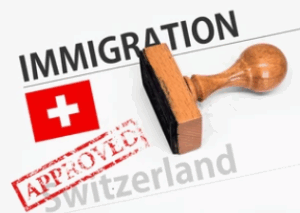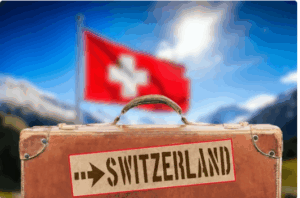SWISS NATURALIZATION
Becoming a Swiss citizen
Swiss citizenship can be acquired through birth, adoption, marriage or through an application after 10 years of residency in Switzerland.
Children born overseas to a Swiss parent automatically hold Swiss citizenship until the age of 25 years old. If they hold another citizenship and have not been formally declared to the Swiss authorities, their Swiss nationality is lost after the age of 25 (art. 7 al. 1 LN).
Becoming a Swiss citizen implies a genuine desire to be integrated and the willingness to be involved in political and social life in Switzerland.

Swiss citizenship
To apply for Swiss citizenship, it is mandatory to hold a C permit and to have lived in Switzerland for at least 10 years. Time spent in Switzerland under a B or C permit, or with a carte de légitimation (CLD), counts towards this requirement (art. 33 LN).
If the applicant left Switzerland for more than six months during the 10 year residency period, this is considered as a gap and does therefore not count towards the 10 year requirement (art. 33 al. 3 LN).
Under certain conditions, a naturalization reintegration procedure can be initiated within a 10 year period after the loss of Swiss citizenship by the applicant (art. 26 and 27 LN).
Ordinary naturalization
As of January 2018, the law on Swiss citizenship or Loi sur la nationalité (LN) requires applicants to hold a C permit and to have lived in Switzerland for at least 10 years in order to be eligible for Swiss citizenship (art. 9 al. 1 LN).
The residency requirements for each canton may differ. For instance, applicants in Geneva must have resided in the canton for a minimum of two years before applying, while the canton of Vaud requires at least three years of residency.
To be naturalized, good integration is demonstrated through the ability to speak and write the language of the canton (A2 written B1 oral), financial stability by being employed or following studies, absence of debts or criminal proceedings and a respect of Swiss values and national security (art. 12 LN).
Facilitated naturalization
The spouse of a Swiss citizen can request Swiss citizenship after three years of marriage and at least five years of residency in Switzerland or after six years of marriage if the couple lives overseas and the spouse has strong ties with Switzerland (art. 21 LN).
The child of a naturalized citizen can request citizenship if he was under 18 when his parent got naturalized and if he is under 22 years old. The child must have lived at least five years in Switzerland with the past three years just before applying spent in the country (art. 24 LN).
Third generation naturalization
The child of foreign citizens can apply for Swiss citizenship before the age of 25 when:
- he was born in Switzerland
- one of his grandparents was born in Switzerland and held a valid permit
- the child held a C permit for at least five years and followed school in Switzerland
- one of his parents was granted a C permit for at least 10 years and followed school for at least five years in Switzerland (art. 24 LN).
How to proceed?
An ordinary naturalization application is first lodged through cantonal and communal authorities before being sent to the SEM in Bern. A facilitated naturalization procedure is lodged directly with the SEM.
We can prepare your naturalization application on your behalf and assure the liaison with authorities until you receive your citizenship.
More free content on Permits in Switzerland
Browse our free content topics below. Some answers to most of the important and frequently asked questions can be found here.
Moving abroad temporarily and thinking of maintaining your Swiss C permit?
A C permit is Switzerland’s permanent residency, allowing unrestricted work and residence nationwide. It is typically granted after 10 years of residency or 5 years...
Read MoreBusiness visitors to Switzerland
If you are planning a short-term business trip to Switzerland, it is crucial to understand and comply with the relevant immigration regulations. The Schengen...
Read MoreUK citizens planning to move to Switzerland: the 7 things you need to know to apply for a work permit
UK citizens planning to move to Switzerland: the 7 things you need to know to apply for a work permit From January 2021, UK citizens...
Read MoreSwiss residency and housing: Permit and rental insights
Switzerland is a country where Alpine serenity meets economic dynamism! With its world-class infrastructure, political stability, and exceptional quality of life, it is no surprise...
Read MoreMoving to Valais as an expat? The 10 golden rules you need to know
Valais canton offers an incredible work-life balance with a choice of international schools of high teaching quality and dynamic expat communities. Integration is the key...
Read MoreFlash News: New UK Travel Rules for Swiss & EU Citizens from April 2025
As of April 2, 2025, all Swiss and EU citizens, including children and babies, must obtain an Electronic Travel Authorization (ETA) to enter the UK...
Read MoreAre you holding a carte de légitimation or Ci permit and are planning to apply for a Swiss permit ?
Are you holding a carte de légitimation or Ci permit ? What is a CDL? The “carte de légitimation”, or Cdl, is an authorization to...
Read MoreSwiss naturalization: what are the 5 conditions to be eligible?
Swiss naturalization: obtaining Swiss citizenship is often perceived as the holy grail by foreigners, as the ordinary procedure is said to be one of the...
Read MoreUK citizens and the protection of acquired rights, what are the rules ?
Since the end of the post-Brexit transition measures in January 2021, UK citizens no longer hold the same residency rights as EU citizens. However, UK...
Read MoreAre you dreaming of working in the Swiss Alps this winter ? Check out the requirements for the seasonnal L work permit!
Switzerland is a prime destination for seasonal workers, especially during the winter months. Given the short duration of their stay, typically four to six months,...
Read MoreObtaining the Swiss citizenship
What changes under the new law? In June 2014, the Swiss Parliament modified the law regarding the conditions to obtain the Swiss citizenship. This change...
Read MoreWhat is happening in 2017 with Swiss work permit quotas?
The quotas for work permits attributed to non-European citizens in 2017 have been now established by the Federal Council. Bern decided that Switzerland must be...
Read MoreBook your consultation
Book your legal consultation online with English-speaking lawyers! We are located within the law firm OA Legal on the 5th floor at 1 place de Longemalle, 1204 Geneva. Our consultation can be made on Zoom or in our Office for a flat fee of CHF 300.-..










